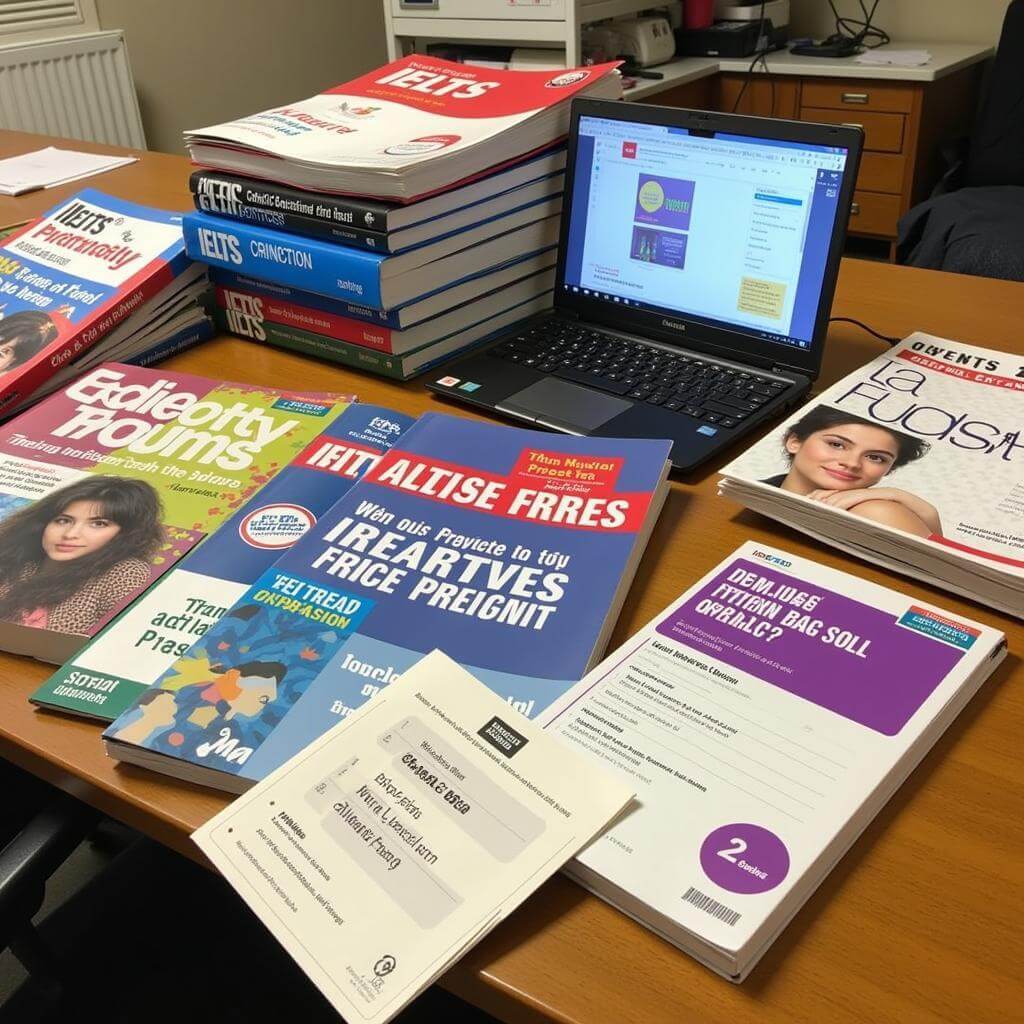Enhancing your IELTS comprehension skills is crucial for achieving a high score. By utilizing effective practice materials, you can significantly boost your understanding across all test sections. This article explores proven strategies for improving comprehension with practice materials, helping you tackle the IELTS exam with confidence.
Understanding the Importance of Practice Materials
Practice materials play a vital role in IELTS preparation. They familiarize you with the exam format, question types, and time constraints. More importantly, they provide a platform for honing your comprehension skills across reading, listening, writing, and speaking sections.
Types of Practice Materials
- Official IELTS practice tests
- Textbooks and workbooks
- Online resources and mock exams
- Authentic English materials (newspapers, podcasts, academic journals)

Strategies for Improving Reading Comprehension
Enhancing your reading comprehension is essential for tackling the IELTS Reading section effectively. Here are some proven strategies:
- Skim and scan techniques
- Identifying main ideas and supporting details
- Practicing timed reading exercises
- Expanding vocabulary through contextual learning
“Regular exposure to diverse reading materials is key to improving comprehension. Aim to read something new every day, even if it’s just for 15 minutes,” advises Dr. Emma Thompson, IELTS preparation expert.
For more in-depth strategies, check out our guide on ways to boost IELTS reading comprehension skills.
Enhancing Listening Comprehension
The IELTS Listening section requires keen attention to detail and quick processing of information. Here’s how to improve:
- Listen to a variety of English accents
- Practice note-taking while listening
- Focus on understanding context and main ideas
- Use dictation exercises to improve accuracy
Improving your grammar skills can significantly enhance your listening comprehension. Learn more about improving grammar for listening answers.
Writing Practice Techniques
Effective writing practice is crucial for both Task 1 and Task 2 of the IELTS Writing section:
- Analyze model answers and identify key features
- Practice paraphrasing and summarizing
- Time yourself regularly to improve speed
- Seek feedback on your writing from tutors or peers
Speaking Practice Strategies
To excel in the IELTS Speaking section, consider these practice techniques:
- Record yourself speaking on various topics
- Practice with a study partner or language exchange
- Use IELTS speaking cards for impromptu practice
- Focus on fluency, pronunciation, and coherence
“Consistent speaking practice, even if it’s just talking to yourself, can dramatically improve your confidence and fluency,” says Mark Roberts, IELTS Speaking coach.
Integrating Grammar Practice
While not explicitly tested, strong grammar skills are essential for high scores across all IELTS sections. Here’s how to incorporate grammar practice:
- Identify your common grammar mistakes
- Use targeted exercises to address weak areas
- Apply grammar rules in context while reading and listening
- Practice error correction exercises
For tips on combining grammar practice with reading, visit our article on how to practice grammar with reading.
Maximizing the Effectiveness of Practice Materials
To get the most out of your practice materials:
- Create a study schedule and stick to it
- Simulate exam conditions during practice sessions
- Review and analyze your mistakes thoroughly
- Use a variety of materials to avoid familiarity bias
Tackling Technical Texts
IELTS often includes technical or academic texts, which can be challenging. To improve your understanding:
- Read scientific articles and academic papers regularly
- Learn to break down complex sentences
- Focus on understanding key terminology
- Practice summarizing technical information
For more guidance, explore our tips for improving understanding of technical texts.
Improving Accuracy in Responses
Accuracy is crucial in IELTS, especially in the Reading and Listening sections. To enhance your precision:
- Pay close attention to question wording
- Practice identifying synonyms and paraphrases
- Double-check your answers for spelling and grammar
- Learn to manage your time effectively to avoid rushed responses
Discover more strategies for improving accuracy in reading to boost your performance.
Conclusion
Improving comprehension with practice materials is a cornerstone of IELTS success. By consistently applying these strategies across all sections of the test, you’ll develop the skills and confidence needed to achieve your desired score. Remember, effective practice is about quality, consistency, and targeted improvement. Stay focused, track your progress, and don’t hesitate to seek additional support when needed. With dedication and the right approach to practice materials, you’ll be well on your way to mastering the IELTS exam.
FAQ
How often should I practice with IELTS materials?
Aim for daily practice, even if it’s just 30 minutes. Consistency is key to improving your comprehension skills.
Are official IELTS practice tests better than other materials?
Official tests are excellent for familiarizing yourself with the exam format, but a mix of materials, including authentic English content, provides a well-rounded preparation.
How can I improve my vocabulary for better comprehension?
Read widely, use contextual learning, and create a personal vocabulary journal. Focus on words and phrases commonly used in IELTS contexts.
Is it helpful to translate practice materials into my native language?
While it may be tempting, try to avoid translation. Instead, focus on understanding in English to improve your overall comprehension skills.
How can I stay motivated during long periods of practice?
Set realistic goals, track your progress, and vary your practice activities. Celebrate small improvements to maintain motivation.
Can watching English movies or TV shows help with IELTS preparation?
Yes, they can be beneficial for improving listening skills and exposure to different accents. However, combine this with focused IELTS practice for best results.